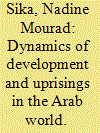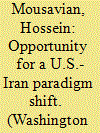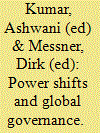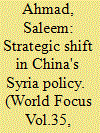|
|
|
Sort Order |
|
|
|
Items / Page
|
|
|
|
|
|
|
| Srl | Item |
| 1 |
ID:
062170


|
|
|
| 2 |
ID:
126680


|
|
|
|
|
| Publication |
2013.
|
| Summary/Abstract |
This essay examines the structural economic reform measures undertaken in the Arab world in the past two decades. Developmental projects in the region have attained growth in gross domestic product, higher levels of human capital, and stable governments. These, however, have been accompanied by corruption, structural economic problems, social exclusion, and negligence of good governance and the rule of law. This essay suggests that the juxtaposition of economic reform and liberalization with corruption, authoritarianism, and absence of good governance were a recipe for the social tumult that became the Arab Spring. Social unrest will remain the rule rather than the exception in the Arab region for the foreseeable future, especially in countries that have undergone regime change, such as Egypt and Tunisia, due to the lack of expected economic and political reforms.
|
|
|
|
|
|
|
|
|
|
|
|
|
|
|
|
| 3 |
ID:
117987


|
|
|
|
|
| Publication |
2013.
|
| Summary/Abstract |
The Arab region today is drenched in chaos and instability: Palestine is bleeding, Iraq burning, Syria erupting, Persian Gulf oil countries are trembling, Lebanon simmering, Afghanistan devastated, and Iran under adversarial focus. An array of unaddressed historical grievances and unresolved disputes add to this chaos. Starting with Tunisia last year, the Arab Street has virtually been under popular siege to break away from long-brewing political morbidity and authoritarian culture.
|
|
|
|
|
|
|
|
|
|
|
|
|
|
|
|
| 4 |
ID:
101539


|
|
|
|
|
| Publication |
London, Anthem Press, 2010.
|
| Description |
xv, 359p.
|
| Standard Number |
9781843318316, hbk
|
|
|
|
|
|
|
|
|
|
|
|
Copies: C:1/I:0,R:0,Q:0
Circulation
| Accession# | Call# | Current Location | Status | Policy | Location |
| 055587 | 327.112/KUM 055587 | Main | On Shelf | General | |
|
|
|
|
| 5 |
ID:
192523


|
|
|
|
|
| Summary/Abstract |
Some Arab countries have since 2011 experienced intense security market diversification with considerable outsourcing of domestic security and guarding services. To date, scholars and security experts predominantly conceive this development within security reform processes or as an inevitable outcome of a chaotic post-uprisings period. Instead, this article situates some Arab states’ increasing reliance on private security actors within the evolving power dynamics and diverse challenges facing ruling elites and populations alike. Addressing how privatizing security contributes to perpetuating authoritarian practices post-2010, the article argues that contemporary security privatization and outsourcing provide alternative agents and strategies for control, while offering new venues to enrich and strengthen ruling elites. Guided by critical security studies and drawing on interviews, fieldwork and official documents, the article advances three ways through which outsourcing security supports practices of authoritarian adaptation: cultivating networks of patronage, diversifying ruling elites’ bases of security, and curbing constant sources of unrest.
|
|
|
|
|
|
|
|
|
|
|
|
|
|
|
|
| 6 |
ID:
129707


|
|
|
|
|
| Publication |
2014.
|
| Summary/Abstract |
The Arab region is a significant exporter of energy resources for China's expanding economy in the world. Moreover, it serves as an area in which China can demonstrate its rising "international status and influence" which was traditionally dominated by the United States. The outbreak of the Syrian crisis in March 2011 posed serious challenges for Chinese foreign policy. China has also supported the UN Mission in Syria and Kofi Annan's plan, but vetoed three UNSC Resolution on Syria, pointing to its foreign policy principle of "Libyan experience", where the military intervention overthrew the Qaddfi's regime, and subsequent instability badly undermined Chinese economic interests. However, China's manoeuvring approach like talks with the Syrian opposition, supporting some of the UN initiatives, and opposing sanctions, is aimed at preventing the "domino effect", strengthening relations with other states in the Arab region, and asserting China's international significance.
|
|
|
|
|
|
|
|
|
|
|
|
|
|
|
|
|
|
|
|
|